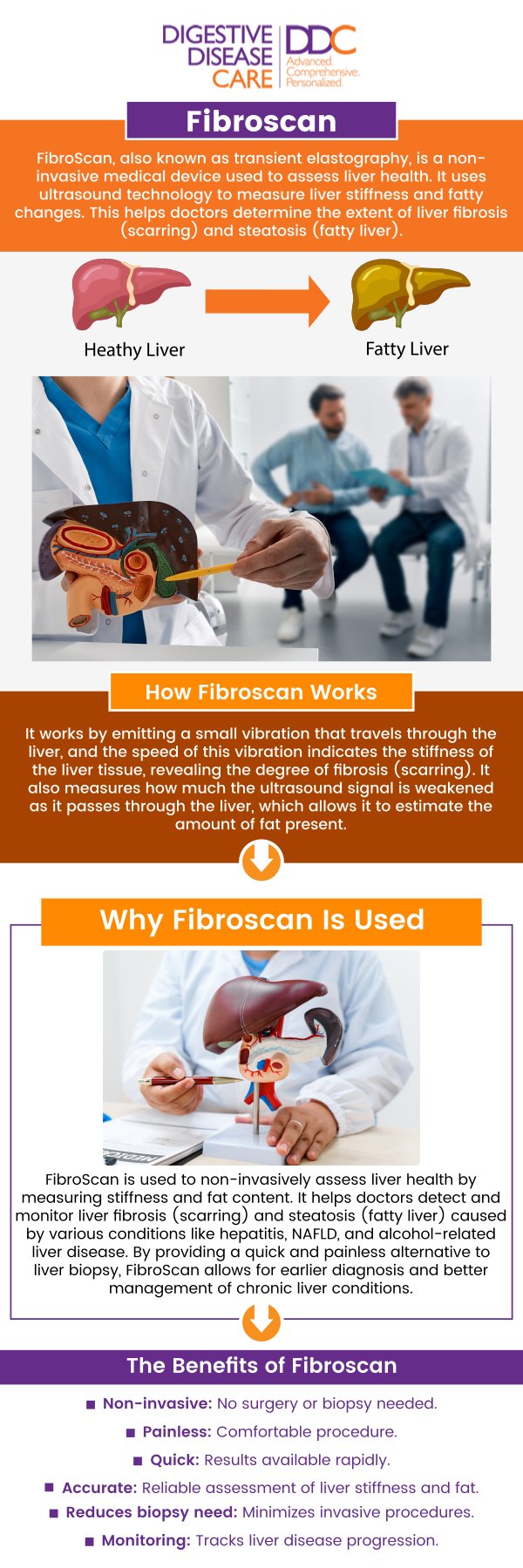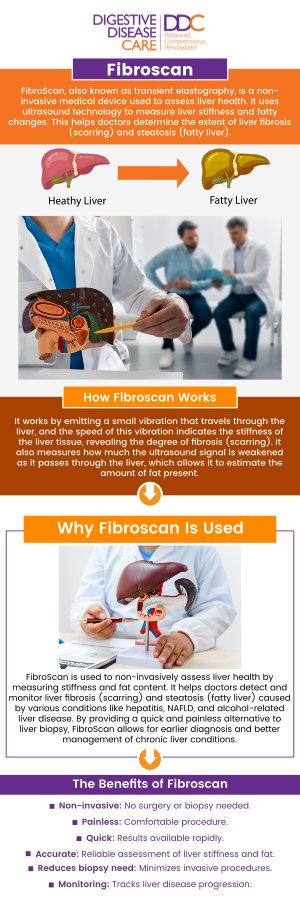Cirrhosis: Diagnosis and Management
Cirrhosis is a serious liver condition caused by long-term damage that leads to scarring and reduced liver function. Diagnosis often involves blood tests, imaging, and sometimes a liver biopsy to assess the extent of damage. At Digestive Disease Care (DDC), board-certified gastroenterologists provide comprehensive management plans to slow progression, treat complications, and support overall liver health. For more information, contact us today or schedule an appointment online. We have convenient locations to serve you in Babylon NY, East Setauket NY, Forest Hills NY, Jericho NY, Lake Success NY, Melville NY, Mineola NY, Massapequa NY, New Hyde Park NY, and Riverhead NY.


Table of Contents:
What is cirrhosis?
What are the main causes of cirrhosis?
What are the symptoms of cirrhosis?
What kinds of tests are used to diagnose cirrhosis?
What are the main goals of cirrhosis management?
Cirrhosis is a serious liver condition that develops as a result of long-term liver damage. At Digestive Disease Care, we specialize in diagnosing and managing this complex disease.
Definition:
• Cirrhosis occurs when healthy liver tissue is replaced with scar tissue (fibrosis).
• This scarring disrupts the liver’s normal structure and makes it harder for the organ to function properly.
Causes:
• Chronic hepatitis infections (such as hepatitis B or C).
• Fatty liver disease is related to obesity, diabetes, or metabolic syndrome.
• Long-term alcohol use.
• Other conditions leading to chronic liver injury.
Impact on the Body:
• Reduced ability to filter toxins from the blood.
• Impaired production of proteins for blood clotting.
• Decreased support for healthy digestion and nutrient absorption.
Common Symptoms:
• Fatigue and weakness.
• Loss of appetite and weight loss.
• Jaundice: Yellowing of the skin and eyes.
• Easy bruising or bleeding.
• Swelling in the legs or abdomen.
• Confusion or difficulty concentrating.
Why Early Care Matters:
• Cirrhosis is generally irreversible, but early intervention can slow progression.
• Treatment helps manage symptoms and reduce complications like liver failure.
• Specialists at Digestive Disease Care provide advanced diagnostics and personalized treatment to protect liver and digestive health.
Cirrhosis is a progressive condition where the liver becomes scarred and loses its ability to function properly. At Digestive Disease Care, we identify and manage the leading causes to help patients protect their liver health.
Common Causes of Cirrhosis:
• Chronic Alcohol Abuse: Long-term alcohol use damages liver cells, causing inflammation and scarring.
• Chronic Viral Hepatitis: Hepatitis B and C infections can lead to persistent liver inflammation and cirrhosis if untreated.
• Nonalcoholic Fatty Liver Disease (NAFLD): Strongly linked to obesity, diabetes, and metabolic syndrome; can progress to cirrhosis if unmanaged.
• Inherited Diseases: Conditions such as hemochromatosis (iron overload) and Wilson’s disease (copper accumulation) damage the liver over time.
• Autoimmune Hepatitis: The immune system mistakenly attacks liver cells, leading to chronic inflammation and fibrosis.
• Chronic Bile Duct Diseases: Disorders like primary biliary cholangitis and primary sclerosing cholangitis block bile flow and cause liver injury.
Why Early Diagnosis Matters:
• Cirrhosis is irreversible, but identifying the cause early allows for treatments that slow disease progression.
• Advanced diagnostics such as blood tests, imaging, and liver biopsy can detect the underlying condition.
• Personalized care at Digestive Disease Care includes antiviral therapy, lifestyle change
Cirrhosis is a progressive liver disease where scar tissue replaces healthy tissue, reducing the liver’s ability to function. Symptoms often develop gradually and may worsen over time.
Early Symptoms:
• Fatigue and weakness.
• Loss of appetite and nausea.
• Unintended weight loss.
• Swelling in legs and ankles (edema).
• Fluid buildup in the abdomen (ascites).
Other Common Signs:
• Yellowing of the skin and eyes (jaundice).
• Itchy skin.
• Easy bruising or bleeding.
• Spider-like blood vessels on the skin (spider angiomas).
• Redness in the palms (palmar erythema).
Advanced Symptoms:
• Confusion, memory problems, or personality changes due to hepatic encephalopathy.
• Severe abdominal swelling.
• Increased vulnerability to infections.
Why Early Care Matters:
• Cirrhosis may not show symptoms until it is advanced.
• At Digestive Disease Care, advanced testing helps detect cirrhosis early.
• Early diagnosis and personalized treatment can slow progression, manage symptoms, and prevent complications.
If you experience any of these symptoms or have risk factors such as hepatitis, heavy alcohol use, or fatty liver disease, seek prompt evaluation at Digestive Disease Care for expert liver care.
At Digestive Disease Care, we recommend a variety of advanced diagnostic tools to accurately evaluate liver health and confirm cirrhosis.
1. Blood Tests
• Measure liver enzymes, bilirubin, albumin, and clotting factors to check how well the liver is functioning.
• It can detect liver damage, the severity of the disease, and complications such as low platelet counts.
2. Imaging Studies
• Ultrasound: Noninvasive test to assess liver size, texture, nodules, or portal hypertension.
• CT scans and MRI: Provide more detailed imaging of liver structure and potential complications.
• Elastography (specialized ultrasound): Measures liver stiffness, which helps determine the extent of scarring (fibrosis).
3. Liver Biopsy
• Sometimes recommended when blood tests and imaging are inconclusive.
• Involves taking a small tissue sample for microscopic analysis.
• Provides definitive information on the degree of fibrosis or scarring.
4. Personalized Evaluation
• Each patient’s diagnosis is based on symptoms, medical history, and risk factors.
• Our team combines clinical expertise with the latest technology for accurate and tailored care.
At Digestive Disease Care, these diagnostic tools allow us to detect cirrhosis early, determine its severity, and create personalized treatment plans to protect your liver and overall health.
At Digestive Disease Care, cirrhosis management focuses on slowing disease progression, treating the cause, and preventing complications. Key goals include:
1. Slow or Halt Liver Damage
• Support patients in stopping alcohol use when alcohol is the cause.
• Provide antiviral therapy for chronic hepatitis.
• Manage metabolic conditions such as obesity, diabetes, or fatty liver disease.
2. Prevent and Manage Complications
• Monitor and treat issues like portal hypertension, variceal bleeding, ascites, hepatic encephalopathy, and infections.
3. Provide Nutritional and Lifestyle Support
• Offer nutritional counseling to improve liver function and manage symptoms.
• Encourage lifestyle changes that support overall digestive health and well-being.
4. Prepare for Advanced Care if Needed
• Evaluate patients with advanced cirrhosis for liver transplantation.
• Coordinate care to ensure timely referral and comprehensive support.
At Digestive Disease Care, our patient-centered approach combines advanced treatments, preventive strategies, and compassionate care to help individuals with cirrhosis maintain the best possible quality of life. For more information, contact us today or book an appointment online. We have convenient locations to serve you in Babylon NY, East Setauket NY, Forest Hills NY, Jericho NY, Lake Success NY, Melville NY, Mineola NY, Massapequa NY, New Hyde Park NY, and Riverhead NY.

Check Out Our 5 Star Reviews


Additional Services You May Like

Additional Services You May Like
- Abdominal Pain
- Acid Reflux
- Barretts Esophagus
- Bloating
- Capsule Endoscopy
- Celiac Disease
- Colon Cancer Screening
- Colonoscopy
- Constipation
- Crohns Disease
- Diarrhea
- Diverticulitis
- Esophageal PH Monitoring
- Fatty Liver
- Fibroscan
- Gallstones
- Gastroenterologist
- Gastric Chest Pain
- Gluten Intolerance
- Hemorrhoid
- Hemorrhoid Banding
- Hepatitis
- Irritable Bowel Syndrome
- Lactose Intolerance
- Pancreatitis
- Polyps
- Rectal Bleeding
- Stomach
- Ulcerative Colitis
- GI Urgent Care





